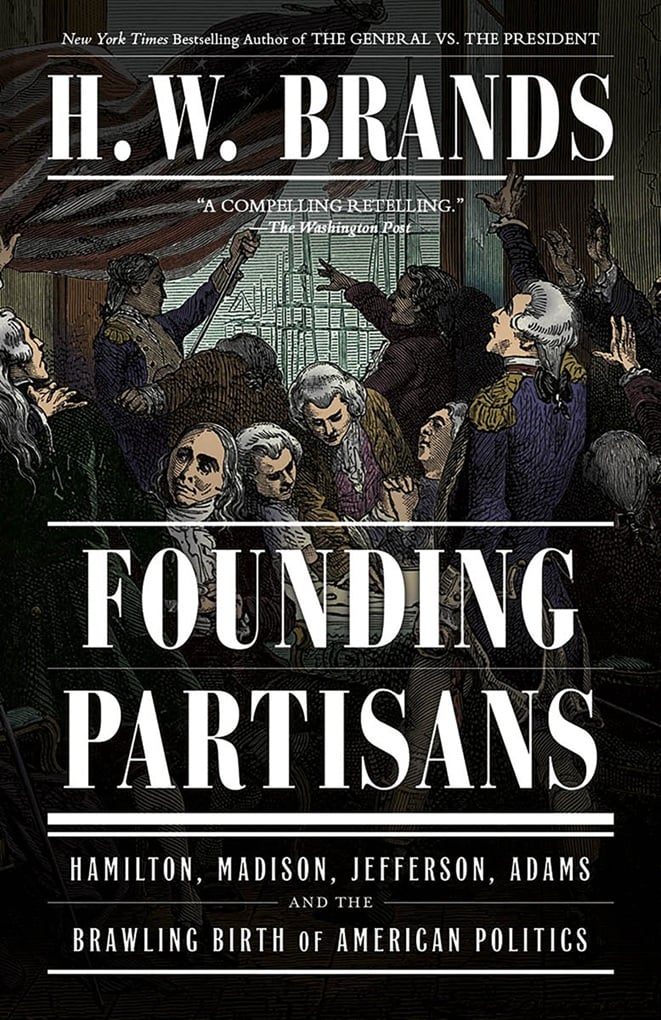Founding Partisans by H. W. Brands
A compelling look at the brawling birth of American politics and the rivalries that still echo today.

After examining the American Revolution in Our First Civil War, it’s only natural that bestselling historian H. W. Brands would turn his attention to the nation’s turbulent early years in Founding Partisans: Hamilton, Madison, Jefferson, Adams, and the Brawling Birth of American Politics.
It took me far too long to get through this book, though that had nothing to do with Brands’ writing. When it’s very hot outside, I have little desire to read and a strong desire to nap instead. That’s why it took me from mid-July to early October to finish the book—some days, I could only get through a few chapters at a time. Cooler weather and the many Jewish holidays (including Shabbos) allowed me to zip through the next two books in my pile.
Brand delivers a revelatory history of how deep political divisions first took hold in the fledgling United States. Founding Partisans uncovers the surprising origins of America’s earliest factionalism, revealing that the fierce rivalries we associate with modern politics were already present at the nation’s founding. I thought I knew the whole story from having read books on Presidents Adams and Jefferson…I didn’t!
The architects of the Constitution viewed political parties as a dangerous threat to the health of the new republic. Having witnessed the destructive effects of partisan politics in Britain, they sought to build a government immune to such divisions. Yet, before the Constitution was even ratified, political factions began to form—and within a decade, they had become a defining feature of American life. In Founding Partisans, Brands captures this transformation through a brisk, engaging narrative of the Founders’ battles over competing visions for the nation’s future.
The Federalists, led by Alexander Hamilton, pushed to replace the Articles of Confederation with a stronger central government. James Madison initially supported this effort, working with Hamilton and John Jay on The Federalist Papers to secure ratification of the Constitution. However, he soon broke with Hamilton over the administration’s economic policies, including the proposal for a national bank.
Madison joined Thomas Jefferson and other opponents of Hamilton in forming the Anti-Administration faction in 1789, which broadly represented Southern interests and championed closer ties with France. By 1792, this faction coalesced into the Democratic-Republican Party. These early divisions culminated in the bitter presidential contest between Jefferson and Federalist John Adams, marking the young republic’s first major partisan conflict and laying the groundwork for the party system that would shape American politics for generations.
The early republic’s politics were marked by contentious elections, constitutional controversies, and bitter personal rivalries. Yet even amid the discord, the new nation managed peaceful transfers of power and laid the groundwork for its future global prominence.
Unfortunately, we cannot discuss this era without noting a key failure of the Founders: their inaction on slavery. By deferring the issue, they passed the problem to later generations, ultimately paving the way for the Civil War in 1860.
At America’s founding in 1776, slavery was legal nationwide. In the years that followed, Pennsylvania and the New England states emancipated their slaves, and New York and New Jersey were expected to follow during or after the 1787 Constitutional Convention. Congress was even drafting an ordinance to ban slavery in the territory north of the Ohio River.
According to Brands, “many Southerners hoped slavery would disappear in the South.” If only it had been that simple. It wasn’t enough that Washington, Jefferson, and other slaveholders considered slavery “an affront to republicanism and a blight on America’s good name.” The failure to abolish slavery outright remains one of the young nation’s enduring moral failings.
Another area that feels strikingly relevant—and sadly too timely—is how Adams clashed with the media in the years leading up to the 1800 election. The Alien and Sedition Acts of 1798 were designed to restrict both immigration and First Amendment protections, with journalists prosecuted under the Sedition Act—no doubt fueling support for Jefferson’s party. Even today, we see echoes of this in a modern administration that views the press as an enemy of the state. The convicted felon, who currently occupies the Oval Office, has filed countless lawsuits against news networks, some ultimately settled in politically expedient ways, such as securing FCC approval for mergers. But I digress.
Adams endorsed the acts largely in response to tensions with France, especially the XYZ Affair of 1797. Of the four acts, only the Alien Enemies Act of 1798 survives today, revised in 1918 and invoked during the War of 1812, World War I, and World War II. The convicted felon has even attempted to invoke it for expedited deportations, with litigation still ongoing. All of this underscores how the XYZ Affair and the Alien and Sedition Acts set the stage for the contentious 1800 election—and reminds us how some political tactics echo across centuries.
In the end, Founding Partisans reminds readers that political polarization is not a modern invention—it has been woven into America’s story from the very beginning.